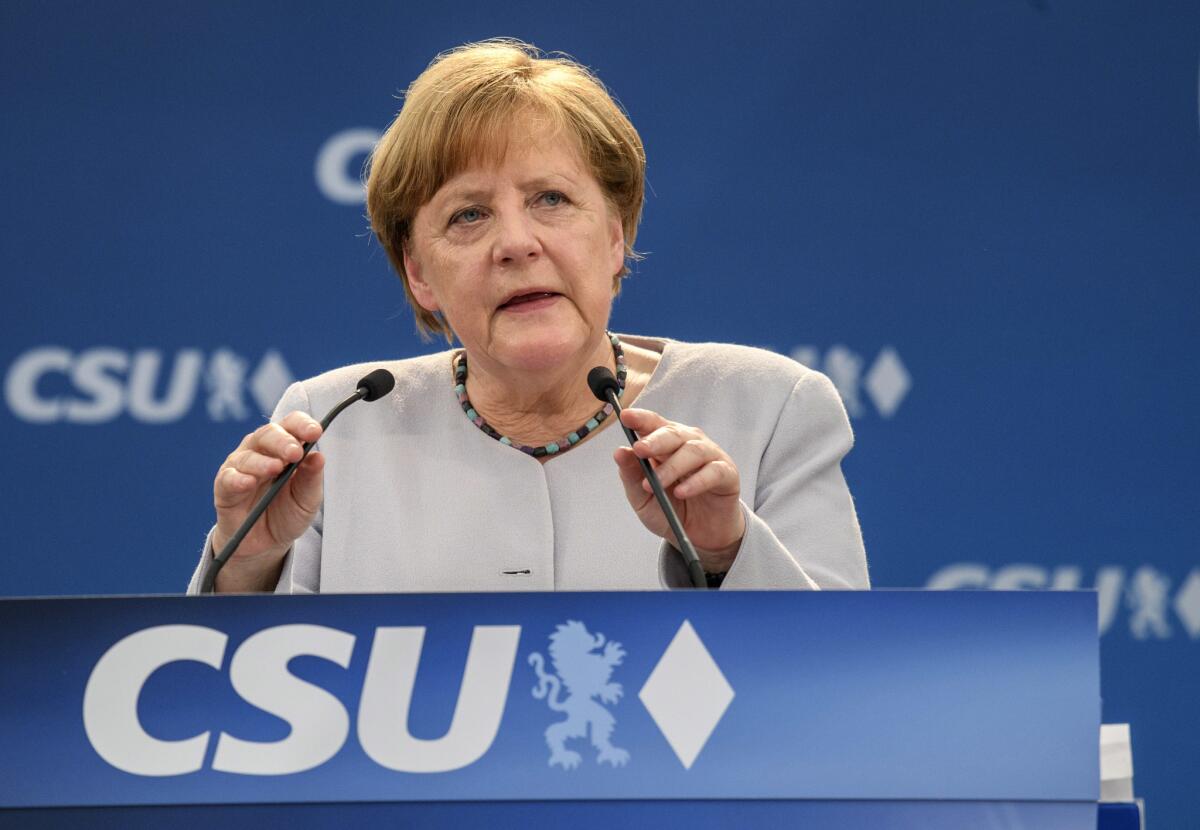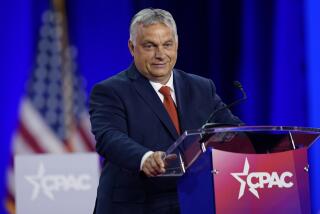Merkel says after Trump visit: Europe must stay united because it cannot ‘fully count on others’

German Chancellor Angela Merkel signaled Sunday she was giving up hope that Europe can rely on the United States while Donald Trump is president.
Merkel spent the last six months trying to connect with Trump to maintain U.S. support on a variety of issues.
But she struck of tone of exasperation Sunday following a week in which Trump refused to commit the United States to the 2015 Paris accord on climate change and failed to explicitly endorse the NATO military alliance core principle, known as Article 5, which says an attack against one member is an attack against all members.
“The era in which we could rely completely on others are gone, at least partially,” Merkel said at a rally in Munich, where she was campaigning for a fourth term in office. “I experienced that over the last several days.”
“As a result of all that, I can only say that it is now time that we really take our own fate into our own hands,” she told a crowd of 2,500 in a beer tent. “Naturally, we’ll maintain our friendship with the United States… wherever possible. But we have to realize that we Europeans are going to have to fight for our own behalf.”
She did not mention Trump by name. But her frustration with him was clear after two international summits they both attended last week: a NATO meeting in Brussels and a gathering of the Group of Seven industrialized nations in Italy.
She told reporters in Italy that talking with Trump about climate change — one of her signature issues since the 1990s — had been “extremely difficult, indeed unsatisfying. It’s a situation where there are six countries lined up against one.”
Germany has long been among the closest allies of the U.S. The Group of Seven also includes Britain, France, Italy, Canada and Japan.
During his election campaign last year, Trump disparaged Merkel for letting in more than a million refugees, mainly from Syria, saying she was “ruining Germany.”
When Trump won, Merkel called to offer congratulations but also admonished him to keep in mind the importance of democratic values and to respect people’s dignity regardless of their origin or the color of their skin, gender, sexual orientation or politics.
In April, she hosted Ivanka Trump, the president’s daughter, on a panel to discuss women’s issues — a move widely interpreted as an attempt to court the new administration.
Merkel told a German newspaper that that month that she and Trump had been cooperating with a common strategy on Ukraine, Syria, the fight against terrorism and other conflicts. “President Trump and I have developed a good working relationship,” she said.
Her pragmatism was aimed at maintaining U.S. support for NATO and preventing a trade war with the U.S., a major customer for German exports. But to many voters, it came across as an effort to appease Trump, who is widely scorned in Germany.
Merkel’s shift in language on Sunday was calculated to help her in her bid for reelection in September, political analysts said.
“To preserve her own credibility, she had to speak out against Trump,” said Gero Neugebauer, a political scientist at Berlin’s Free University. “But for someone as cautious as Merkel, it is still astonishing for her to take the lead in Europe against Trump on something like this. It’s incredible to see her take the leadership.”
Merkel, who has been in office since 2005, stands a high chance of reelection. Her conservative Christian Democrats have won three straight state elections in the last two months, and in polling she and her party have surged ahead of the center-left Social Democrats and their candidate, Martin Shulz.
Kirschbaum is a special correspondent.
ALSO
Trump maps new course with allies and autocrats in first foreign trip
Europe’s reaction to the Trump style ranges from envy to ‘you tiny, tiny, tiny little man’
Trump favors personal connections in his foreign policy
UPDATES:
3 p.m.: This article was updated with Time reporting, including political analysis and details about the relationship between Merkel and Trump.
This article was originally published at 8:30 a.m.
More to Read
Start your day right
Sign up for Essential California for news, features and recommendations from the L.A. Times and beyond in your inbox six days a week.
You may occasionally receive promotional content from the Los Angeles Times.






